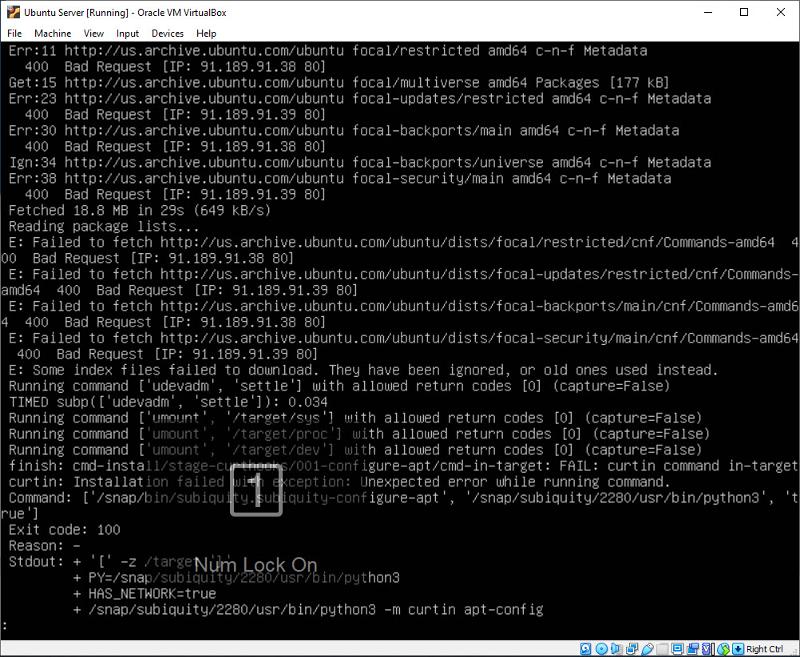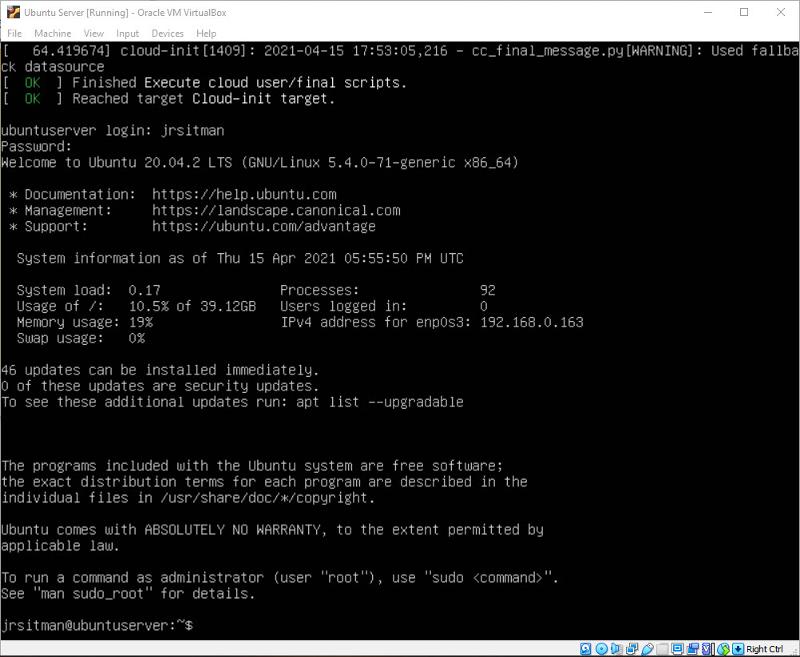Is it possible to set up a Test Linux server at home
I have a job interview next week that prefers some Linux experience. Is it possible to set up a test server on my home computer?
ASKER CERTIFIED SOLUTION
membership
This solution is only available to members.
To access this solution, you must be a member of Experts Exchange.
ASKER
I am not looking for a lot of experience. I just want to be able to tell them that even though I have no experience, I took the initiative to install and test.
After it is installed are there any links you can send to give me some "basic" knowledge?
After it is installed are there any links you can send to give me some "basic" knowledge?
There is a wealth of linux knowledge on the internet...
Just a couple I got from a google search...
https://www.linode.com/docs/guides/linux-system-administration-basics/
https://www.temok.com/blog/linux-system-administration/
https://www.tutorialspoint.com/linux_admin/index.htm
I think you should first pick what distro you are going to install, then search based on that because there are subtle differences in administration.
Just a couple I got from a google search...
https://www.linode.com/docs/guides/linux-system-administration-basics/
https://www.temok.com/blog/linux-system-administration/
https://www.tutorialspoint.com/linux_admin/index.htm
I think you should first pick what distro you are going to install, then search based on that because there are subtle differences in administration.
ASKER
It looks like Ubuntu is a good place to start.
ASKER
If video is a good match for your learning style, then it looks good to start...
You can use / learn linux in 3 perspectives:
1- as administrator
2- as developer
3- as normal user
As normal user, you will learn how to:
- connect to the system remotely and logn
- learn the various commands and utilities available to e.g. manage files and directories, manage your processes, etc. and this is from either command prompt or GUI.
As developer, in addition to normal user experience, you would like to learn the available development tools e.g. programming languages and compilers, shell scripting or other scripting languages, databases, etc. This will purely depends on what you want to use as developer.
As system administrator, where you need to have the normal user experience plus how to:
- install linux
- create ad manage users
- maanage disks and file systems
- manage processes
- install additional S/W
- upgrades and S/W patches
1- as administrator
2- as developer
3- as normal user
As normal user, you will learn how to:
- connect to the system remotely and logn
- learn the various commands and utilities available to e.g. manage files and directories, manage your processes, etc. and this is from either command prompt or GUI.
As developer, in addition to normal user experience, you would like to learn the available development tools e.g. programming languages and compilers, shell scripting or other scripting languages, databases, etc. This will purely depends on what you want to use as developer.
As system administrator, where you need to have the normal user experience plus how to:
- install linux
- create ad manage users
- maanage disks and file systems
- manage processes
- install additional S/W
- upgrades and S/W patches
ASKER
I haven't done much reading yet but I'm still a little confused on how to actually start the installation.
If you can create a virtual linux machine and download any linux flavor iso file, then you can boot your vm from that and follow the installation screens for default installation.
ASKER
Thanks I'm going to work on this all day tomorrow
I assume you have a windows box...
Go to https://www.virtualbox.org/
Download and install.
If you plan on installing a 64 bit linux, you will need to turn on virtualization support in your bios.
Download an iso of the distro you want to virtualize
Run virtualbox and create your vm.
Follow the prompts...
Go to https://www.virtualbox.org/
Download and install.
If you plan on installing a 64 bit linux, you will need to turn on virtualization support in your bios.
Download an iso of the distro you want to virtualize
Run virtualbox and create your vm.
Follow the prompts...
You can learn the basics by searching e.g. google "linux commands and utilities tutorial"
ASKER
Thank you very much the link to the video I sent you actually goes through all of the command lines.
What system are you using?
look at downloading Ubuntu and run as a liveCD.
IMHO, might as well be straight forward and say you are willing to learn.
Without knowing the extent of familiarity they are interested in, what can be learnt in a short window.
It might not cone off well.
I.e. People getting a new attire For some ...camping, hiking etc.
look at downloading Ubuntu and run as a liveCD.
IMHO, might as well be straight forward and say you are willing to learn.
Without knowing the extent of familiarity they are interested in, what can be learnt in a short window.
It might not cone off well.
I.e. People getting a new attire For some ...camping, hiking etc.
You can try various linux distributions at
https://distrotest.net
All you need is a VNC client. Once you get a basic idea, you can install on your computer. As others suggested installing on a vmware or virtualbox is good to start.
As for learning, there are lot of youtube videos, this is a 5:30 hours video on linux server administration
https://www.youtube.com/watch?v=WMy3OzvBWc0
https://distrotest.net
All you need is a VNC client. Once you get a basic idea, you can install on your computer. As others suggested installing on a vmware or virtualbox is good to start.
As for learning, there are lot of youtube videos, this is a 5:30 hours video on linux server administration
https://www.youtube.com/watch?v=WMy3OzvBWc0
ASKER
Thanks, I'll be installing it today
depending on which system you have. virtualization might be a built-in option available to you.
much depends on the nature of the linux familiarity that you need to have for the position.
it could be the knoweldge of what is possible to allay some tasks to the different platform versus another.
much depends on the nature of the linux familiarity that you need to have for the position.
it could be the knoweldge of what is possible to allay some tasks to the different platform versus another.
ASKER
I tried installing the Ubuntu server using Virtualbox. The install fails. I've tried twice.
How do I send the report to you to view why it failed?
How do I send the report to you to view why it failed?
Did you capture any screen prints?
Or did you make sure the virtualization options are turned on in your bios?
Or did you make sure the virtualization options are turned on in your bios?
ASKER
Did not capture screen prints.
I did turn on virtualization this morning
I did turn on virtualization this morning
ASKER
I just shut down my computer and went into the BIOS to make sure that virtualization was enabled. It is
Change your network in the VM to "Bridged Adaptor"
It looks like you downloaded a "network install" ISO and it is failing because it can't get to the internet to download components.
It looks like you downloaded a "network install" ISO and it is failing because it can't get to the internet to download components.
Network as long as it is present will work without regard whether the IP being passed to the VM from the host or exposed to the LAN.
the issue whether the network is setup in the first place.
The question is whether the network interface is present in the VM definition is being detected
.
download the entire dvd.
Did you download the VM, multipass version?
https://ubuntu.com/download/server
you can download the DVD for Manual server install.
or are you downloading the desktop version?
the issue whether the network is setup in the first place.
The question is whether the network interface is present in the VM definition is being detected
.
download the entire dvd.
Did you download the VM, multipass version?
https://ubuntu.com/download/server
you can download the DVD for Manual server install.
or are you downloading the desktop version?
ASKER
I changed the adapter and I'm restarting the installation. No I did not download the multipass version. Only the server version
ASKER
It is currently downloading and installing updates. So that looks good.
ASKER
The screen is here. I know it say Complete, just want to be sure before I reboot it
Looks OK to me...
ASKER
Thanks
It looks as if you are.
Basic TTY or how it looks from a connected monitor.
Basic TTY or how it looks from a connected monitor.
ASKER
Thank you I will start watching some of the YouTube training
You should have knowledge in
https://www.youtube.com/watch?v=aLpSNPIFRQQ
https://linoxide.com/linux-interview-questions-answers/
https://www.guru99.com/linux-interview-questions-answers.html
https://www.softwaretestinghelp.com/linux-interview-questions-answers/
https://s3-ap-southeast-1.amazonaws.com/tv-prod/documents%2Fnull-alinuxmaterial.PDF
- Unix/Linux Administration
- OS Installation and Troubleshooting
- Unix/Linux security
- Unix/Linux networking
https://www.youtube.com/watch?v=aLpSNPIFRQQ
https://linoxide.com/linux-interview-questions-answers/
https://www.guru99.com/linux-interview-questions-answers.html
https://www.softwaretestinghelp.com/linux-interview-questions-answers/
https://s3-ap-southeast-1.amazonaws.com/tv-prod/documents%2Fnull-alinuxmaterial.PDF
yes, to elevate your rights, run sudo -i
at that point you will have root's shell.
as it is you are running as a regular user.
at that point you will have root's shell.
as it is you are running as a regular user.
ASKER
Thanks I ran it.
ASKER
Thank you all very much


https://ubuntu.com/download/server